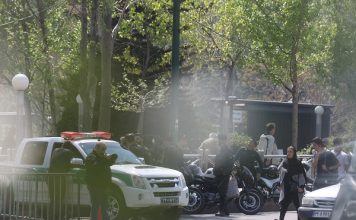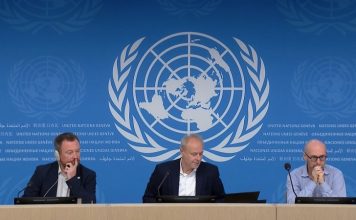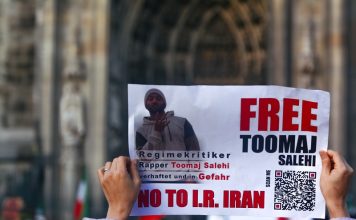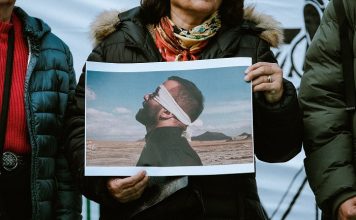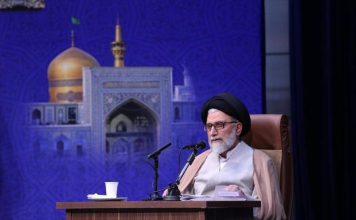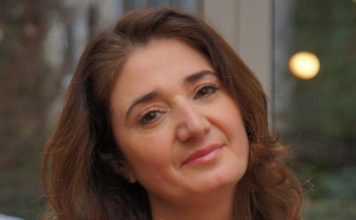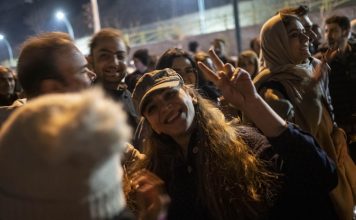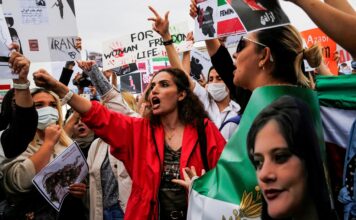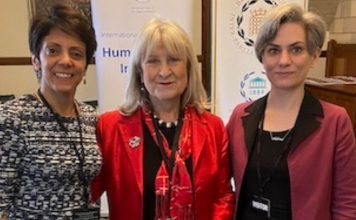By Kayhan Life Staff
Branch 28 of Tehran’s Revolution Court has handed a one-year prison sentence to Saleh Nikbakht, the lawyer for the family of Mahsa (Zhina) Amini, the Tehran-based Didban Iran news website said on Oct. 17.
Mr. Nikbakht, accused of “propaganda against the state,” was also banned from using social media for two years; the latter sentence falls under the “additional penalty law,” enabling the presiding trial judge to impose additional punishment at their discretion.
[aesop_image img=”https://kayhanlife.com/wp-content/uploads/2023/10/salleh-bikbakht.jpg” panorama=”off” credit=”Saleh Nikbakht, the lawyer for the family of Mahsa (Zhina) Amini. KL./” align=”center” lightbox=”on” captionsrc=”custom” captionposition=”left” revealfx=”off” overlay_revealfx=”off”]
Ms. Amini, a 22-year-old Iranian woman accused of wearing “improper hijab,” lost her life on Sept. 16, 2022 while in the custody of the Morality Police in Tehran. Her death sparked a nationwide protest that became a global movement with the slogan “woman, life, freedom.”
Authorities also charged Nikbakht, a practicing attorney and law professor, with giving interviews to Persian-language media abroad.
In an interview with Didban Iran, Nikbakht’s lawyer, Ali Rezaei, said: “He [Nikbakht] was interviewed nine times. The texts of these interviews have been included in his file. The interviews were about Ms. Amini’s death, traders [who transport goods on their backs walking in rough trains and border regions], and speaking about a prisoner’s release. They have been used as evidence in the case file.”
“My client’s interviews were all related to his work as a lawyer,” Mr. Rezaei argued. “The interviews were not crimes, and the defendant has said as much. However, the revolution court ignored the defendant’s testimony and submitted his interview with [the Tehran-based] Etemad newspaper about the investigation of Mahsa Amini’s death as evidence of his ‘action against the state’ and convicted him on that basis.”
“The court ignored the defense’s argument,” Rezaei said. “As a legal expert, I stress that not a single sentence in his interview amounts to ‘propaganda against the state.’ The conviction resulted from an illegal interpretation of the interview.”
“The court sentenced [Nikbakht] to one-year imprisonment, the maximum penalty allowed under Article 500 of the Islamic Republic penal code,” Rezaei explained. “It is astonishing that he is handed the maximum penalty, given he is nearly 73 years old and convicted for giving an interview, which is not a crime.”
Rezaei argued that although “the conviction resulted from illegal interpretations of the text of the interviews,” Nikbakht “did not intend to dispute the verdict and file for an appeal.” However, Rezaei hoped the verdict would be overturned during future legal proceedings, adding that he planned to file for an appeal.
Article 500 of the Islamic Republic Penal Code, passed by the Majlis (Iranian Parliament) and ratified by the Guardian Council in 1996, states: “Anyone acting against the Islamic Republic system [state] or engaged in propaganda against the system on behalf of groups or organizations hostile to the system, will be sentenced to three months to one-year imprisonment.”
Mahsa Amini, Women’s Movement in Iran Win EU’s 2023 Sakharov Freedom Prize
In an interview with Etemad newspaper on Oct. 18, Saleh Nikbakht said: “They [authorities] accused me of using the word murder in my interview with Etemad. However, during the interview, I noted that ‘because the incident was being investigated as a crime, then it would be classified as a homicide.’ That is the basis of the charges against me.”
According to Nikbakht, the Ministry of Intelligence’s information office summoned him four or five times.
“I was told not to speak to foreign media,” Nikbakht said. “That is why there is no record of me being interviewed by media abroad. I could have either released a statement or spoken to Etemad newspaper.”
Nikbakht explained that although the authorities had not banned him from speaking to the domestic media, his interview with Etemad “was deemed an offense, and eventually, I was sentenced to one-year imprisonment.”
“I had nothing to do with media abroad that cited my interview with Etemad,” He asserted.
Nikbakht also noted that his interviews with the media in previous years were used as evidence in the case against him.
“Other interviews used as evidence against me date back to 2019, i.e., the period between the spring of 2019 and the spring of 2023,” Nikbakht explained. “Two instances related to Mahsa [Amini] and seven to other events. One of those seven cases was my interview with the BBC, condemning Turkey for attacking Syria and violating its sovereignty.”
“Other Iranian media outlets had condemned Turkey’s attack on Syria. However, because it involved our government, it was deemed an offense. That is why I was given the maximum penalty of one-year imprisonment,” Nikbakht noted.
Nikbakht believes that the case against him is part of a broader policy by the Ministry of Intelligence to “silence lawyers.”
Islamic Republic’s Treatment of Women and Girls Condemned by UN Experts
Highlighting a marked change in the Ministry of Intelligence’s treatment of lawyers, Nikbakht said: “The treatment [of lawyers] was mostly respectful previously. Before offering us advice and guidance, the gentlemen [authorities] would listen to our convincing arguments and explanations.”
“However, their treatment of lawyers has changed in the past few months,” Nikbakht noted. “Authorities try to silence lawyers and stop them from speaking out. If you read the transcript of my trial, you will discover how strange the entire case was.”
Nikbakht argued that the absence of an independent judiciary and efforts to impede lawyers is detrimental to the country’s legal, social, economic, and foreign trade relations.
“Foreign investors will do business with Iran only if there are independent legal institutions and judiciary in the country,” Nikbakht noted. “The current pressure on lawyers will undoubtedly discourage foreign companies and economic cartels from investing in Iran.”
“An independent Judiciary and courts can only exist when both sides of an argument can have legal representation, who discuss, debate and exchange views, leading to a verdict and discovery of the truth,” Nikbakht argued. “The truth damages no country, no matter how bitter it could appear to be. Pressuring the legal community would question justice in Iran.”
Saleh Nikbakht is not the only lawyer being pressured and harassed by the authorities in Iran.
According to reports, at least 44 lawyers have been summoned or detained in Iran since the nationwide protest in September 2022, most of whom represented civil and political activists arrested during the protests. Some lawyers sympathized with protesters and condemned the brutal crackdown on civilians.
In the months following the mass protest, three female lawyers, Maryam Arvin, Narges Khorrami-Fard, and Mohebat Mozaffari, died under suspicious circumstances. No independent criminal investigation has ever been conducted into these lawyers’ deaths.
To further restrict the ability of lawyers and their independence, the Majlis recently passed a resolution transferring the authority to issue law licenses from the Iran Central Bar Association to the Ministry of Economic Affairs and Finance, sparking a massive protest by attorneys.
Link to the Kayhan.London/Persian

